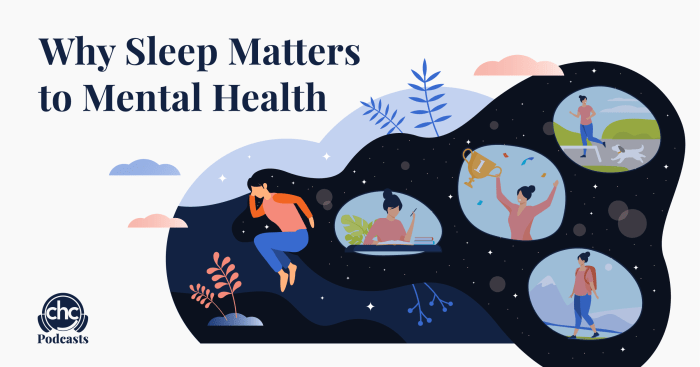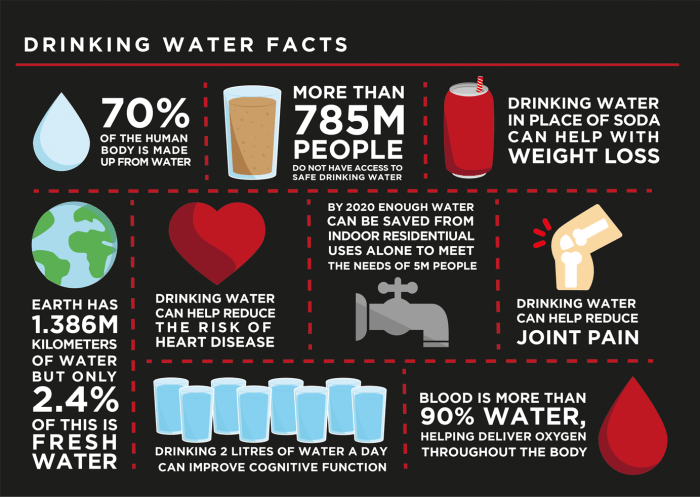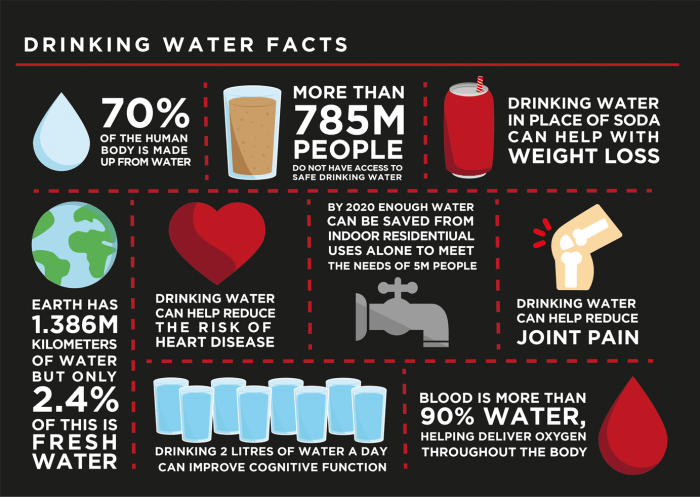Heres why drinking water is the key to good mental health – Here’s why drinking water is the key to good mental health. Staying hydrated isn’t just about physical well-being; it profoundly impacts your mental clarity, mood, and overall cognitive function. This exploration delves into the intricate connection between water intake and brain health, revealing how proper hydration can be a powerful tool for managing stress, boosting focus, and enhancing mental well-being.
From the crucial role water plays in neurotransmitter production to its influence on mood regulation, this article will equip you with actionable strategies to unlock the mental health benefits of hydration. We’ll explore practical tips, insightful research, and inspiring examples to demonstrate how incorporating more water into your daily routine can transform your mental state.
The Role of Hydration in Brain Function

Staying properly hydrated is crucial for overall well-being, and the brain, being the control center of the body, is particularly sensitive to fluctuations in hydration levels. Dehydration can significantly impact cognitive function, mood, and even physical performance. This article delves into the intricate relationship between water and brain health, exploring how hydration affects neurotransmitter production, cognitive processes, energy levels, blood flow, and ultimately, the health of brain cells.Neurotransmitters are chemical messengers that transmit signals between nerve cells.
Proper hydration is essential for the synthesis and function of these crucial molecules. Adequate water intake supports the chemical reactions that create neurotransmitters, ensuring efficient communication within the brain. Conversely, dehydration can disrupt these processes, leading to imbalances in neurotransmitter levels and impacting cognitive functions.
Impact of Hydration on Neurotransmitter Production and Function
The brain relies on a complex interplay of neurotransmitters for various functions, including mood regulation, memory formation, and attention. Water is vital for the chemical reactions that produce these neurotransmitters. Reduced water intake can result in lower neurotransmitter levels, impacting cognitive functions. For example, dopamine, a neurotransmitter associated with motivation and reward, is affected by hydration levels.
Dehydration can impair dopamine production, leading to reduced motivation and potentially impacting mood.
Effect of Dehydration on Cognitive Processes
Dehydration has a direct impact on cognitive functions like memory and attention. When the body is dehydrated, the brain cells do not receive the proper amount of nutrients and oxygen through the bloodstream, which impairs their ability to function optimally. This can manifest as difficulty concentrating, slower reaction times, and decreased memory performance. For instance, a person experiencing mild dehydration might find it harder to recall specific details or solve problems requiring focus.
Relationship Between Hydration Levels and Brain Energy Levels
The brain requires a consistent supply of energy to function effectively. Water plays a vital role in transporting nutrients and oxygen to the brain cells, facilitating the energy production process. Dehydration can lead to reduced energy levels, affecting the brain’s ability to perform complex tasks. This is evident in situations where people experience fatigue, difficulty concentrating, or a general sense of sluggishness when they are not properly hydrated.
Impact of Hydration on Blood Flow to the Brain
Water is critical for maintaining blood volume and pressure. Adequate hydration ensures that sufficient blood flows to the brain, delivering oxygen and nutrients to the brain cells. Dehydration can cause blood vessels to constrict, reducing blood flow and impacting the brain’s ability to function optimally. This can result in reduced cognitive performance and difficulty with tasks that require sustained mental effort.
For example, when blood flow to the brain is compromised, a person may experience headaches, dizziness, or even confusion.
Relationship Between Hydration and Brain Cell Health
Hydration is essential for maintaining the health and function of brain cells. Water is a critical component of the brain’s structure and helps regulate its temperature. Dehydration can lead to cellular damage, impacting the brain’s overall functionality. For instance, prolonged dehydration can cause cell shrinkage and impair the efficiency of communication between neurons.
Effects of Dehydration on Brain Function
| Severity of Dehydration | Impact on Brain Function |
|---|---|
| Mild Dehydration (1-2% loss of body weight) | Reduced focus, decreased memory, minor headaches, fatigue. |
| Moderate Dehydration (3-5% loss of body weight) | Significant cognitive impairment, difficulty concentrating, confusion, decreased alertness, increased irritability. |
| Severe Dehydration (more than 5% loss of body weight) | Severe cognitive impairment, seizures, delirium, organ failure, potentially life-threatening. |
Water’s Influence on Mood Regulation
Drinking enough water is crucial for overall well-being, and its impact extends far beyond physical health. Hydration plays a significant role in mood regulation, influencing everything from stress levels to the production of vital neurochemicals. Understanding the intricate connection between water intake and emotional state can empower us to proactively support our mental health.Maintaining optimal hydration levels is essential for a balanced mood.
Water acts as a crucial transport medium for nutrients, including those needed for neurotransmitter production and regulation. Dehydration can disrupt this delicate balance, leading to various mood fluctuations. This section delves into the mechanisms through which water affects mood regulation, exploring the relationship between hydration and stress hormones, and the ways dehydration can impact mental health.
The Impact of Hydration on Stress Hormones
Dehydration can trigger a cascade of physiological responses that negatively affect mood. When the body is dehydrated, it perceives a state of stress. This perceived stress can lead to an increased release of stress hormones like cortisol. Elevated cortisol levels can contribute to feelings of anxiety, irritability, and even depression. Conversely, proper hydration can help maintain healthy cortisol levels, promoting a more stable emotional state.
The Link Between Hydration and Mood-Boosting Neurochemicals
Water is integral to the production and function of neurochemicals that influence mood. These vital chemical messengers, like serotonin and dopamine, play crucial roles in regulating emotions. Dehydration can disrupt the production and transport of these neurochemicals, potentially leading to feelings of sadness, irritability, or difficulty concentrating. Adequate hydration ensures these vital processes function optimally, contributing to a more balanced and positive emotional state.
Examples of Dehydration-Triggered Mood Swings
Dehydration can manifest in various ways, impacting mood in subtle or more pronounced ways. A sudden shift in mood, from calmness to irritability, might be a sign of dehydration. Difficulty concentrating or feeling mentally sluggish can also stem from a lack of water. Even mild dehydration can contribute to headaches, which often lead to frustration and anxiety.
These examples highlight the subtle but significant connection between hydration and mood.
Studies Demonstrating the Impact of Hydration on Mood
Several studies have investigated the correlation between hydration and mood. One study found that participants who increased their water intake reported a decrease in feelings of anxiety and an improvement in overall mood. Another study demonstrated a positive link between hydration and cognitive function, including improved focus and concentration, suggesting a direct relationship between water intake and mental clarity.
Comparing Dehydration-Related Mood Swings with Other Mood Disorders
| Characteristic | Dehydration-Related Mood Swings | Mood Disorders (e.g., Anxiety, Depression) |
|---|---|---|
| Onset | Sudden, often related to a period of decreased water intake | Gradual, often spanning weeks or months |
| Duration | Temporary, usually resolving with increased water intake | Chronic, requiring professional intervention and ongoing management |
| Symptoms | Irritability, anxiety, difficulty concentrating, headaches, fatigue | Persistent sadness, loss of interest, changes in sleep or appetite, feelings of hopelessness, physical symptoms |
| Associated Factors | Dehydration, lack of sleep, stress | Genetics, brain chemistry, life events, environmental factors |
This table provides a general comparison, highlighting key differences between dehydration-related mood fluctuations and established mood disorders. Professional medical advice should be sought for any persistent or concerning mood changes.
Hydration and Mental Clarity
Staying hydrated is crucial for maintaining optimal brain function. Our brains are composed largely of water, and adequate hydration directly impacts our cognitive abilities. From focus and concentration to overall mental sharpness, the effects of hydration are profound and often underestimated. This section will delve into the intricate link between water intake and mental clarity, examining how dehydration affects our cognitive performance and how hydration impacts our mental state throughout the day.Proper hydration is essential for maintaining mental clarity.
The brain relies heavily on water to transmit signals between neurons, facilitating efficient communication and processing. Dehydration can disrupt this intricate process, leading to a cascade of negative effects on cognitive function. Understanding this connection is vital for optimizing our mental performance.
The Connection Between Water Intake and Mental Clarity
Water is the lifeblood of cognitive function. Adequate hydration is directly linked to improved focus, attention, and memory. When properly hydrated, the brain can efficiently transmit signals, leading to sharper cognitive performance. This effect is observable in various situations, from everyday tasks to high-pressure situations.
Effects of Dehydration on Focus and Concentration
Dehydration significantly impairs focus and concentration. A slight degree of dehydration can negatively impact cognitive performance, reducing attention span and hindering the ability to concentrate on tasks. The brain’s ability to process information is compromised, making it harder to maintain focus. This can lead to decreased productivity and efficiency in various aspects of daily life.
How Hydration Influences Cognitive Performance in Various Situations
The influence of hydration on cognitive performance is noticeable across different situations. During demanding tasks like studying or working on complex projects, proper hydration is critical for sustained focus and concentration. Even in social settings, where mental agility and alertness are essential, hydration plays a key role. Maintaining adequate water levels allows for optimal cognitive function, regardless of the environment or task.
Comparing the Impact of Water Intake on Mental Fatigue with the Effects of Caffeine
While caffeine can provide a temporary boost in alertness, its effects are often short-lived and can be accompanied by a subsequent crash. Water, on the other hand, provides sustained hydration and supports long-term cognitive function without the jitters or energy fluctuations associated with caffeine. This consistent support contributes to sustained mental clarity and reduced fatigue throughout the day.
The Link Between Hydration and Mental Sharpness Throughout the Day
Mental sharpness is maintained throughout the day with consistent hydration. The brain functions optimally when adequately hydrated, ensuring clear thinking and sharp responses. This consistent support is vital for performing at peak cognitive levels throughout the day, from morning tasks to evening activities. Fluctuations in hydration levels throughout the day can lead to significant drops in mental sharpness.
Table: Cognitive Performance Comparison
| Beverage | Immediate Effect on Focus | Sustained Effect on Focus | Impact on Mental Fatigue |
|---|---|---|---|
| Water | Improved focus and concentration | Sustained mental clarity | Reduced mental fatigue |
| Coffee/Tea | Short-term boost in alertness | Potential for crash and jitters | May initially reduce fatigue but can lead to later fatigue |
| Soda | Minor initial boost, followed by a dip | Potential for dehydration and reduced cognitive function | May lead to temporary energy spikes, followed by a crash |
Practical Strategies for Staying Hydrated
Staying hydrated is crucial for optimal mental and physical health. Water plays a vital role in numerous bodily functions, including transporting nutrients, regulating temperature, and supporting cognitive processes. Consistent hydration is essential for maintaining energy levels, focus, and overall well-being. It significantly impacts mood regulation and clarity of thought.
Recognizing Thirst Cues, Heres why drinking water is the key to good mental health
Thirst is a natural bodily signal indicating a need for water. Ignoring these cues can lead to dehydration, which can negatively impact cognitive function and emotional regulation. Paying attention to the subtle signs of thirst, such as dry mouth, headache, or fatigue, is essential for proactive hydration. Recognizing and responding to these signals is key to maintaining consistent hydration levels throughout the day.
The Power of a Reusable Water Bottle
Carrying a reusable water bottle is a simple yet effective strategy for staying hydrated. Having a readily available source of water encourages regular consumption throughout the day. A reusable bottle reduces plastic waste and promotes environmental consciousness. Its portability allows for hydration on the go, making it an indispensable tool for maintaining adequate water intake.
Hydration Timing for Optimal Performance
The timing of water intake can significantly impact performance, especially during physical activity. Consuming water before, during, and after exercise is crucial for maintaining optimal bodily functions. Drinking water before a workout ensures the body is adequately hydrated for the activity. During exercise, water intake helps regulate body temperature and replenish fluids lost through sweat. Post-workout hydration is essential for restoring fluid balance and aiding muscle recovery.
Healthy Hydration Alternatives to Sugary Drinks
Sugary drinks often contribute to dehydration and offer minimal nutritional value. Replacing these with healthier alternatives like infused water, herbal teas, or low-sodium broths is a crucial step towards better hydration. Infused water can be customized with fruits, vegetables, or herbs for a refreshing and flavorful way to consume water. Herbal teas, rich in antioxidants, offer a comforting and hydrating option.
Low-sodium broths are a nutritious way to replenish electrolytes lost through sweat.
A Guide to Water Content in Fruits and Vegetables
| Fruit/Vegetable | Approximate Water Content (%) |
|---|---|
| Watermelon | 92 |
| Cucumber | 96 |
| Spinach | 92 |
| Celery | 95 |
| Strawberries | 91 |
| Lettuce | 95 |
| Orange | 87 |
| Grapefruit | 91 |
This table demonstrates the varying water content in common fruits and vegetables. Consuming these hydrating foods can contribute to overall daily water intake. By incorporating these foods into your diet, you can naturally increase your water consumption and support your overall well-being.
Staying hydrated is crucial for a healthy mind. Dehydration can lead to foggy thinking and mood swings, making it hard to focus and manage stress. This directly impacts productivity, even in areas like navigating complex licensing agreements for software like Microsoft Office. For example, understanding the nuances of microsoft huawei us export license windows office software requires a clear head.
Ultimately, consistent water intake fuels cognitive function, contributing to better mental well-being.
Water and Mental Well-being in Different Scenarios: Heres Why Drinking Water Is The Key To Good Mental Health
Staying hydrated is crucial for overall well-being, and its impact on mental health is profound. Our brains are approximately 73% water, and maintaining optimal hydration levels directly affects cognitive function, emotional regulation, and overall mental clarity. This section explores the significant role of water in mental health across various life circumstances.
Impact of Hydration on Mental Well-being During Stress
Stress significantly depletes the body’s water reserves. Chronic stress can lead to dehydration, which in turn exacerbates stress responses. Adequate hydration helps to regulate the body’s physiological stress response by maintaining electrolyte balance and supporting the proper functioning of the nervous system. When stressed, the body releases cortisol, and hydration helps mitigate the negative effects of this hormone.
Maintaining a consistent water intake can lead to a more balanced mood and a greater ability to cope with stressful situations.
Staying hydrated is crucial for a healthy mind, and I’ve always found that drinking enough water really helps my focus and mood. However, with all the stressful news out there, like the recent FBI email system hack with those fake cybersecurity warnings fbi email system hacked fake cybersecurity warnings , it’s easy to let your water intake slip.
But remember, a clear head is a happy head, and good hydration is key to a clear mind, so keep sipping that water!
Importance of Adequate Hydration During Illness or Recovery
Illness and recovery periods often require increased hydration to support the body’s healing processes. Fevers, vomiting, and diarrhea lead to significant fluid loss, which, if not replenished, can impair cognitive function and overall recovery. Hydration plays a vital role in transporting nutrients to cells, removing toxins, and maintaining proper bodily functions. During illness, focus on clear fluids like water, electrolyte drinks, and broths to facilitate healing and prevent dehydration-related complications.
Effects of Hydration on Mental Performance in Academic Settings
Proper hydration is essential for optimal cognitive function, crucial for academic success. Dehydration can lead to decreased concentration, impaired memory, and reduced alertness, impacting learning and performance. Students who maintain adequate hydration levels tend to experience improved focus, better memory retention, and enhanced overall cognitive function. This, in turn, positively impacts academic performance and overall mental well-being.
Staying hydrated is crucial for mental clarity, but sometimes, even with ample water intake, your body needs a little extra support. Have you considered innovative recovery tools like the Hyperice x this high tech cold and heat pack for your knees might blow your mind? This technology might be just the boost you need, especially if you’re experiencing discomfort.
Ultimately, though, consistent water intake remains the cornerstone of optimal mental wellness.
Comparison of Hydration Practices Across Different Cultures
Hydration practices vary considerably across cultures, influenced by factors such as climate, lifestyle, and cultural norms. Some cultures emphasize drinking water throughout the day, while others have specific rituals or preferences for consuming water at certain times. The variety highlights the diverse ways people approach hydration, emphasizing the need for individuals to find hydration practices that align with their needs and lifestyles.
While cultural norms influence hydration habits, the fundamental importance of adequate hydration remains consistent across all cultures.
How Water Intake Impacts Sleep Quality and Mental Rest
Adequate hydration contributes to better sleep quality and mental rest. Dehydration can disrupt sleep patterns, leading to difficulty falling asleep, frequent awakenings, and poor sleep quality. Conversely, proper hydration supports the body’s natural sleep-wake cycle, promoting relaxation and promoting deeper, more restorative sleep. By ensuring sufficient water intake throughout the day, individuals can enhance their sleep quality and experience improved mental well-being.
Hydration Needs in Different Climates and Activity Levels
| Climate | Activity Level | Daily Hydration Needs (approximate) |
|---|---|---|
| Cold | Sedentary | 2-3 liters |
| Cold | Moderate Activity | 3-4 liters |
| Cold | High Activity | 4+ liters |
| Hot | Sedentary | 3-4 liters |
| Hot | Moderate Activity | 4-5 liters |
| Hot | High Activity | 5+ liters |
This table provides a general guideline for daily hydration needs based on climate and activity level. Individual needs may vary depending on factors like metabolism, overall health, and specific dietary choices. These are approximate values and should be adjusted based on individual circumstances.
Illustrative Examples of Hydration Benefits
Staying hydrated isn’t just about quenching thirst; it’s a crucial element for optimal mental well-being. Proper hydration plays a vital role in cognitive function, mood regulation, and overall mental clarity. From boosting focus during demanding tasks to reducing mental fatigue, the benefits of sufficient water intake are numerous and demonstrably impactful.Improved hydration translates to noticeable improvements in mental sharpness and focus.
When you’re adequately hydrated, your brain functions at its peak, leading to enhanced concentration and improved cognitive performance. This is especially relevant in situations requiring sustained mental effort, like studying for exams or working on complex projects.
Improved Concentration in Daily Tasks
Adequate hydration is essential for maintaining mental acuity throughout the day. When properly hydrated, the brain receives the necessary nutrients and oxygen to function optimally, leading to improved concentration. A lack of hydration can result in mental fogginess, making it harder to focus on tasks, leading to decreased productivity. For example, a student studying for an exam might find their concentration significantly improved by sipping water throughout their study session.
Connection Between Adequate Water Intake and Reduced Mental Fatigue
The body’s natural processes rely heavily on water for energy production and waste removal. Sufficient hydration helps the body eliminate toxins and maintain energy levels. When dehydrated, the body struggles to function at its best, leading to increased feelings of fatigue and mental sluggishness. This effect is noticeable throughout the day, from the afternoon slump to evening tasks.
For instance, a professional working long hours can experience a noticeable reduction in mental fatigue by increasing their water intake.
Story of Overcoming a Mental Health Challenge Through Hydration
Sarah, a young professional, struggled with persistent anxiety. She noticed a correlation between her anxiety levels and her hydration habits. By consistently increasing her water intake throughout the day, Sarah experienced a significant reduction in her anxiety symptoms. She attributed this improvement to the increased energy levels and mental clarity that proper hydration brought. This is a testament to the powerful role water can play in managing mental well-being.
Hydration Positively Impacting Cognitive Performance in a Specific Situation
During a high-stakes negotiation, Mark noticed he was becoming mentally fatigued. His ability to think clearly and strategize effectively was diminishing. He realized he hadn’t been drinking enough water throughout the day. By taking short breaks to drink water, Mark re-energized his cognitive function and made crucial decisions with enhanced clarity. This experience highlighted how hydration can dramatically influence cognitive performance in crucial moments.
Inspirational Quote Emphasizing the Importance of Hydration
“Water is the elixir of life, both for the body and for the mind. Hydrate yourself, and watch your mental clarity flourish.”Unknown
Summary

In conclusion, the link between hydration and mental health is undeniable. By understanding the vital role water plays in brain function, mood regulation, and mental clarity, you can take proactive steps towards optimizing your well-being. Remember, consistent hydration isn’t just a suggestion, it’s a fundamental pillar of good mental health. Start incorporating these practical strategies into your daily life, and experience the transformative power of water for yourself.




